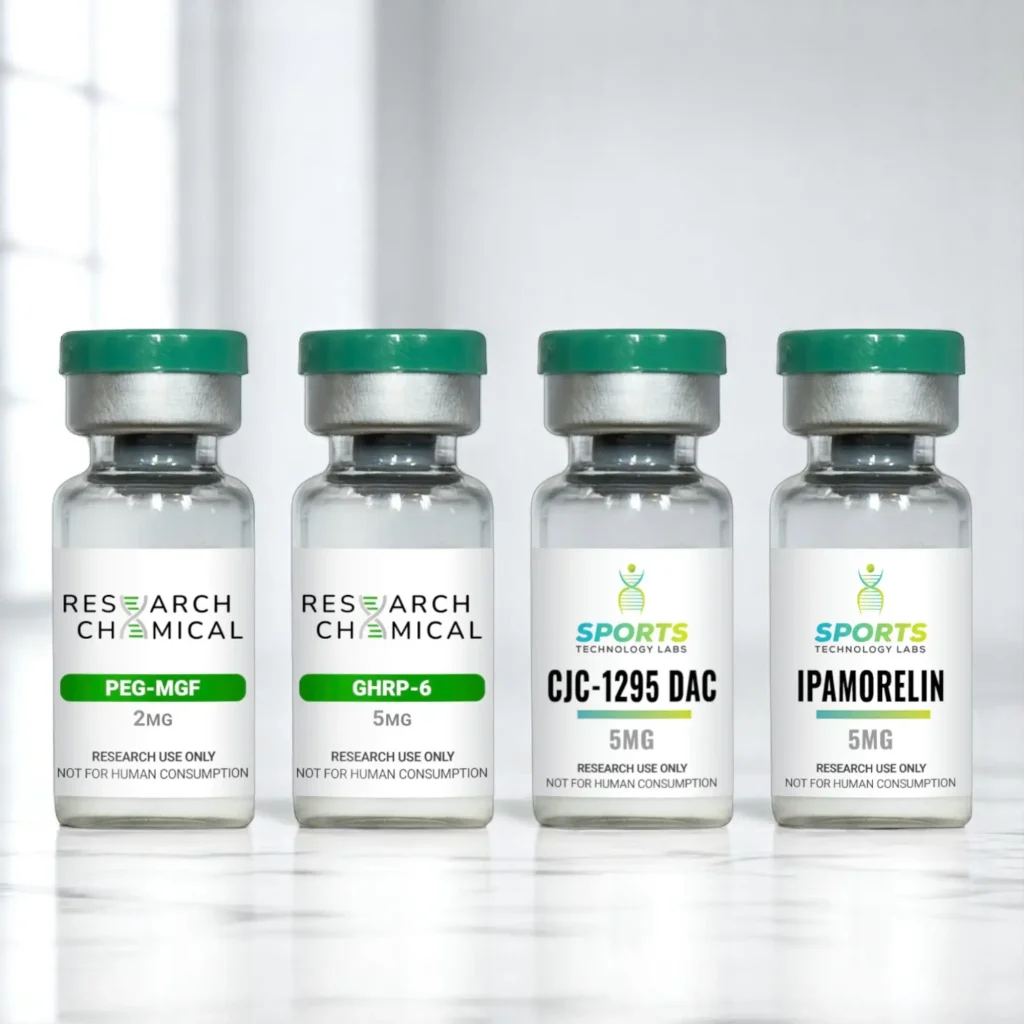Best Peptide for Muscle Growth — Scientific Insights for Research Use
Disclaimer:
The compounds mentioned in this article are research chemicals not approved for human consumption. This content is intended solely for educational and scientific reference. PeptideInformation.com, Research Chemical, and Sports Technology Labs do not promote or endorse the personal use of any substance discussed herein.
Introduction: What Makes a Peptide “Best” for Muscle Growth — in Research?
When evaluating peptides for their potential in muscle growth, researchers examine mechanisms like protein synthesis, GH/IGF-1 signaling, and satellite cell activation. This article explores several compounds frequently studied in animal models and in vitro environments.
If you’re searching for the “best peptide for muscle growth” for personal use — this is not the article for you. These peptides are for laboratory research only.
Top Peptides Studied for Muscle Growth in Scientific Research
CJC-1295 (with DAC)
CJC-1295 is a GHRH analog that promotes growth hormone release and increases IGF-1 in research models. The DAC (Drug Affinity Complex) extends its half-life significantly, making it ideal for sustained GH stimulation in animal studies.
- Class: GHRH analog
- Half-life: ~5–8 days (with DAC)
- Research Focus: GH/IGF-1 axis modulation and anabolic activity in muscle tissue
Ipamorelin
Ipamorelin is a ghrelin receptor agonist (GHSR-1a) that selectively increases GH without raising cortisol or prolactin — a rare characteristic useful for studying muscle protein synthesis without endocrine interference.
- Class: Growth hormone secretagogue
- Half-life: ~2 hours
- Research Focus: Short-term GH pulse modeling and regeneration studies
PEG-MGF (Pegylated Mechano Growth Factor)
PEG-MGF is a splice variant of IGF-1 that plays a role in muscle repair and satellite cell activation. Pegylation enhances stability for extended release in tissue models.
- Class: Modified IGF-1 variant
- Half-life: ~48–72 hours
- Research Focus: Muscle regeneration post-injury
IGF-1 LR3 (Long R3 IGF-1)
IGF-1 LR3 is a recombinant analog of IGF-1 with increased potency and receptor affinity. It is widely used in laboratory settings to study hypertrophy, cell differentiation, and mTOR pathway activation.
- Class: IGF-1 analog
- Half-life: ~20–30 hours
- Research Focus: Cell signaling, anabolic response in myotube culture

How Are These Peptides Used in Scientific Research?
These compounds are used in:
- In vitro muscle cell models
- Rodent and non-human studies
- GH/IGF pathway investigations
- Muscle regeneration and healing assays
Importantly, none of these peptides are approved by the FDA for human use or medical treatment. They are strictly for controlled laboratory experimentation.
Why Source Research Peptides from Verified Suppliers?
Companies like Research Chemical and Sports Technology Labs are committed to scientific purity, COA transparency, and ethical standards. Here’s why researchers trust them:
- Third-party lab testing (HPLC, Mass Spec)
- Real-time batch COAs available
- Cold-chain shipping for peptide stability
- Zero tolerance for consumer misuse
⚠️ Avoid suppliers that:
- Do not publish batch-specific COAs
- Use language implying human use
- Fail to provide compound identification or purity data
Conclusion: Best Peptides for Muscle Growth — A Research-Only Viewpoint
CJC-1295, Ipamorelin, PEG-MGF, and IGF-1 LR3 are among the most studied peptides in muscle growth research. However, their value lies in controlled environments — not consumer products.
Ethical sourcing and data transparency are vital. That’s why Research Chemical and Sports Technology Labs stand apart: they serve the scientific community with integrity, testing, and compliance.
Further Reading
For more information on other peptides, read about BPC-157 and other peptides here.
For additional details on research peptide quality, browse the Research Chemical peptide catalog. Learn more about Sports Technology Labs’ testing standards to ensure you’re sourcing from trusted suppliers.
Frequently Asked Questions
Q: Are these peptides safe for humans?
A: No. These are research chemicals not intended or approved for human use.
Q: Where can labs purchase these compounds?
A: Through vetted suppliers like Research Chemical and Sports Technology Labs, strictly for scientific research.
Q: Which peptide is most studied for muscle hypertrophy?
A: IGF-1 LR3 and CJC-1295 are frequently studied for their role in GH/IGF-1 modulation in animal muscle models.
Q: Can peptides like these cause muscle growth?
A: In controlled experiments, some peptides stimulate pathways related to muscle development. But their use is confined to laboratory research only.
Scientific References
- Ionescu, M., & Frohman, L. A. (2006). Pulsatile secretion of growth hormone (GH) persists during continuous stimulation by CJC-1295, a long-acting GH-releasing hormone analog. The Journal of Clinical Endocrinology & Metabolism, 91(12), 4792-4797.
- Sackmann-Sala, L., Ding, J., Frohman, L. A., & Kopchick, J. J. (2009). Activation of the GH/IGF-1 axis by CJC-1295, a long-acting GHRH analog, results in serum protein profile changes in normal adult subjects. Growth Hormone & IGF Research, 19(6), 471-477.
- Raun, K., Hansen, B. S., Johansen, N. L., Thogersen, H., Madsen, K., Ankersen, M., & Andersen, P. H. (1998). Ipamorelin, the first selective growth hormone secretagogue. European journal of endocrinology, 139(5), 552-561.
- Enserink, J. M., Christensen, A. E., de Rooij, J., van Triest, M., Schwede, F., Genieser, H. G., … & Bos, J. L. (2002). A novel Epac-specific cAMP analogue demonstrates independent regulation of Rap1 and ERK. Nature cell biology, 4(11), 901-906.
- Goldspink, G. (2002). Gene expression in skeletal muscle. Biochemical Society Transactions, 30(2), 285-290.



